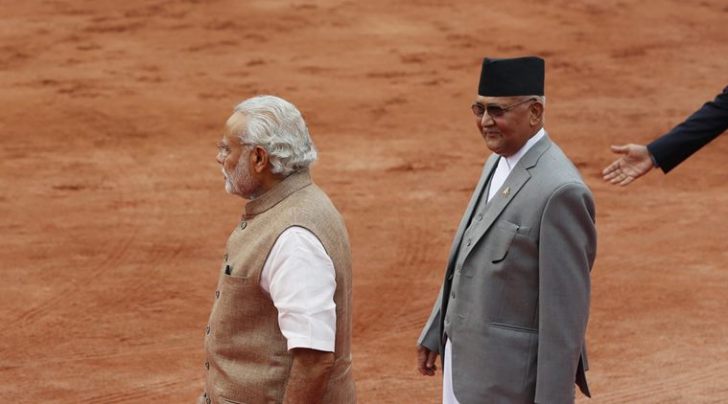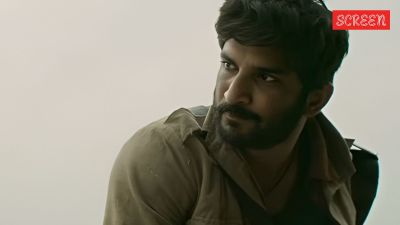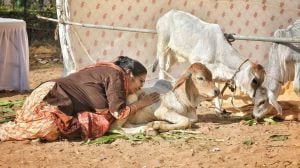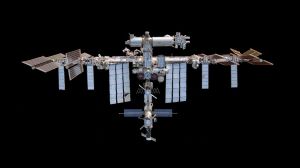This is not an ideal time to expect anything concrete in India-Nepal relations
K P Oli is visiting India to normalise working relations – he is not here to create history by inking deals of high importance
 Nepal’s Prime Minister Khadga Prasad Sharma Oli (R) and Narendra Modi walk during his ceremonial reception at the forecourt of Rashtrapati Bhavan in New Delhi February 20, 2016. (REUTERS/Adnan Abidi)
Nepal’s Prime Minister Khadga Prasad Sharma Oli (R) and Narendra Modi walk during his ceremonial reception at the forecourt of Rashtrapati Bhavan in New Delhi February 20, 2016. (REUTERS/Adnan Abidi)
Came 1990 and Nepal was forced to be on roller-coaster – under a fading monarchy and fledgling democracy. As an institution, monarchy ceased to exist long back – and no longer democracy is in nascent phase over there, but yet, the democratic institutions and principles have not come to full circle in keeping the usual business on track. Since August, Nepal’s tryst with ‘indecisive leadership’ could be seen as a hallmark of fractured participatory framework that Nepali democracy embraced after the promulgation of the new Constitution, with serious flaws.
Materialised by India’s arrogant ruling regime, Kathmandu’s accidental power-grabbers and big three manipulators of Madhesi Morcha, the five months old self-defeating blockade – is over without reaching any logical end. The ‘undeclared trade blockade’, imposed by India with excuses in Madhesi movements, incorrigibly kept the basic ‘right to life’ in hostage for this deeply ravaged nation by earthquake. At this point of time, it should be reckoned that like the supremacy of monarchy – a pretension of working for masses by the opportunist radicals and regional forces is harming national interest. The long spell of gloom, formed with the collapse of ‘real politic’, is giving enough reasons for systemic overhaul.
Even though the blockade is under an unknown deal, this should be hailed. Where the quest stands for survival, it would be too cruel to judge the things based on convenience of authoritative elites. The ruling regime in Kathmandu could do a course correction in addressing the genuine grievance of Madhesis, with amending remaining five important clauses – and halting a serious alienation of the country’s other half population. But in case, K P Oli chooses to play with the system – rather than getting it fixed, his survival on the PM’s chair is not going to be easy. Another point he must remember, he is visiting India to normalise the working relations with India – he is not here to create history by inking deals of high importance.
[related-post]
When the innocent citizens were being killed in Madhes – and subsequently the members of police in retaliation, there was no genuine urge shown from the political stakeholders, for changing the ominous traps rolled-out by well-offs. It would have much better if the Madhesi’s disillusionment would have equally directed for Madhesi Morcha leaders – as much it was for cryptic and nasty UML/UCPN (M)’s leaderships, grown-up with adulterated ideological grooming.
Madhesis must get the equal citizenry rights – to avail what Nepal offers to her citizens. The Madhes movement should be seen as manifestation of mass aspirations for equal opportunity. It is not really aimed to thrive on ‘multi-nationality’, a creation of few insensitive voices in media and civil society. Nepal will return to complete normalcy only once it ensures giving Madhesis, the rights, they have been hitherto denied.
KP Oli, now a lapsed radical, has a better chance to play safe – and perform his constitutional duties, without counting too much in keeping the country divided over imposed contentious provisions. Now he needs to be much more serious to resolve the long pending issues of Madhes, tribes and women. He and his fellow political friends should also realise that India and China are two different countries – and their ‘cards’ are too harmful for Nepal. This is not the time to look ‘back or forth’ – the present is just too critical, and bringing house in order should naturally top the priorities.
Unlike Oli, the prime minister of India, Narendra Modi loves events, camera and headlines. Once over with one event, he leaps on for another one – and for making news, he doesn’t mind flying to distant lands. He is a traveler, who often forgets the facts – hence his opinion, which appears like promises unbound – seldom delivers anything after momentous hype-gathering. In fact, his own government is still in making – and surviving particularly because of his party’s brute majority in Lok Sabha – and with traction of India’s strong democratic institutions.
With undeserving handlers at top, this is not an ideal time to expect anything concrete in India-Nepal relations. Modi’s lack of understanding on foreign policy is seconded by his counterpart from Nepal – and the real prospects get blurred with that. Indeed, Nepal’s ongoing political crisis has to be resolved internally – any further attempts from the leaders of Delhi will hold no real merit, given the current regime’s low trust in wisdom and policies.
- 01
- 02
- 03
- 04
- 05































